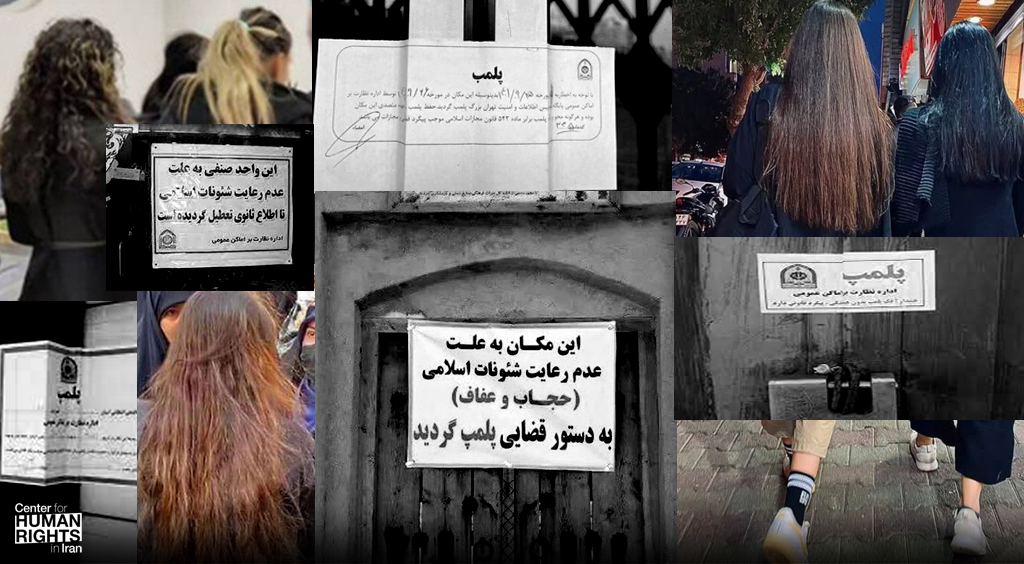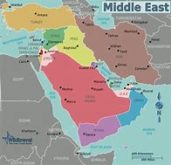CHRI – Business owners in Iran are facing severe consequences, including loss of livelihoods and restricted access to vital services such as banking, due to their support for the “Woman, Life, Freedom” movement. Testimony shared with the Center for Human Rights in Iran (CHRI) reveal the hardships these entrepreneurs, including women business owners, endure.

“Since many businesses and shops closed in solidarity with anti-state protesters in the past year, the Iranian government is concerned that the business sector could provide momentum to the protests,” said CHRI Executive Director Hadi Ghaemi. “Therefore, they are taking measures to suppress any potential organized protests within the business community.”
“By penalizing business owners who permit customers to exercise their right to freedom of expression, the Iranian government exposes the extent of its fear of Iran’s women-led movement for change,” added Ghaemi.
CHRI notes that forcing businesses to cease their operations without a trial represents a breach of the International Covenant on Economic, Social and Cultural Rights (ICESCR), a treaty to which Iran is a signatory.
In particular, this punitive measure violates Article 6 of the ICESCR, which explicitly prohibits governments from obstructing individuals’ access to gainful employment and obliges them to ensure that individuals can exercise their right to work and earn a livelihood in an equitable and just manner.
Woman Business Owner Blocked from Working by Trade Association
“Pari,” whose name has been changed to protect her identity, described in an interview with CHRI the consequences she faced after closing her shop in solidarity with the strikes that were called in support of the protests during the fall of 2022.
For security reasons, CHRI has not disclosed Pari’s exact location or industry to protect her from retaliatory persecution by the Iranian government. We have also withheld certain details from her testimony that could potentially identify her.
During her interview with CHRI, Pari recounted an experience in which she faced threats from the bazaari, a group of traditional Iranian merchants that influences the pricing of goods within her industry. They wielded the specter of a lawsuit that could potentially endanger her entire business. However, it soon became apparent to her that this lawsuit was a mere fabrication, strategically brandished as a means of intimidation. The ultimate goal was to pressure her into renouncing her support for the protests that engulfed Iran in September 2022, initially sparked by the tragic killing of 22-year-old Mahsa Jina Amini while in state custody, a mere few days after her arrest for an alleged hijab-related violation.
Pari said:
“On the day I was summoned to the bazaari’s office, I was told, ‘There’s a private suit against you.’ They informed me that some were claiming I had sold inferior goods or had not paid for the goods I received. However, no one else was present at the meeting. Typically, in such cases, both the plaintiff and the defendant are present. When I inquired, they said the plaintiffs were going to show up. I asked if I could know their names to identify whom I was dealing with, and they responded by saying there were many. This struck me as odd since I knew most of my customers. I realized that the case was baseless.”
Pari shared with CHRI that the bazaari’s objective was to “isolate business owners associated with the movement.” She has since discovered that its leadership has been constructing cases against her, issuing threats, and intimidating her, as well as some of her colleagues.
“Months have passed since that meeting, and I’m still entangled in this situation. I am neither allowed to work nor given access to the names of the plaintiffs,” Pari informed CHRI. “They have frozen my bank accounts, and potential investors are hesitant to collaborate with me. At present, I am in a state of limbo, blacklisted, awaiting to see what fate they have in store for me.”
New Law Imposes Additional Penalties on Unveiled Women, Businesses Who Serve Them
Shortly after the onset of the protests that gripped Iran in September 2022, extending over several months and eventually recognized as the “Woman, Life, Freedom” movement, reports emerged of businesses, including shops, being forcibly closed.
Women in Iran have long faced punitive measures, including detention, for noncompliance with the country’s hijab laws. However, in June 2023, the Iranian Parliament proposed a new law that not only imposed additional penalties on unveiled women—including monetary fines, restrictions on accessing bank accounts, confiscation of personal vehicles, travel limitations, bans on online activity, and imprisonment—but also extended punitive measures to individuals, businesses, and institutions accused of permitting unveiled women on their premises.
During the anniversary week of Iran’s “Woman, Life, Freedom” movement, the Iranian government announced that the bill had received approval from the parliament and had been forwarded to the Guardian Council, an unelected body of Islamic clerics tasked with reviewing bills, with its expected endorsement.
CHRI has warned that this legislation not only exposes women and girls to heightened levels of violence but also deprives them of access to essential services and empowers authorities to impose penalties without due process or a fair trial.
UN human rights experts have characterized the bill as a form of gender apartheid, suggesting that authorities seem to be governing through systemic discrimination to suppress women and girls into complete submission. They emphasized that the proposed parliamentary “Bill to Support the Family by Promoting the Culture of Chastity and Hijab,” along with existing de facto restrictions, such as the denial of economic rights, constitute inherent discrimination and may amount to gender persecution.
“Denying women their livelihoods and essential services due to their political beliefs is not just political persecution; it constitutes gender apartheid,” said Ghaemi. “These serious human rights violations should be investigated by the UN’s independent Fact-Finding Mission on Iran to hold Iranian authorities accountable.”
CHRI emphasizes that Iranian women entrepreneurs already contend with a discriminatory and unequal environment created by the country’s laws that relegate them to second-class citizens. Now, in addition to gender-based disadvantages, they are being specifically targeted and severely punished for advocating fundamental rights.
Other Business Owners Targeted, Some Bend to Pressure
Pari recalled the turbulent days of September and October 2022, when protests were raging in cities across the country under the slogans of “Woman, Life, Freedom” and “Death to the Dictator!” She also described days when with the help of some of her friends, she tried to help the families of detainees and injured protesters.
Pari told CHRI that unlike some of her colleagues, she had refused to submit to the threats in return for economic benefits provided by her business association.
“I have built my own business and brand. Another woman colleague of mine, who had a similar experience with the bazaari, told me: ‘Whatever they say, don’t respond and just go with it.’ When the bazaari contacted me, one of the heads said, ‘Do you realize what you’re doing, ma’am? How many complaints are there against you? You’ve tarnished our industry’s reputation.”
However, some of her colleagues bent to the pressure by their professional association.
“A while ago, I saw one of my colleagues. During the protests, he was also on the streets, but after the protests were widely suppressed in September, he stopped going. He’s a married man with two children. His business license was revoked, he was arrested, and a prison sentence was issued against him,” she said.
She continued,
“However, a few days ago, I saw he had opened a shop in an expensive location. There were many cameras installed at his business. He admitted he had been coerced into submission. They told him that if he cooperated with the bazaari and the security agencies, he could have a prosperous life again.
“He also informed me that speaking to me in public could get him in big trouble,” added Pari.
Numerous Businesses Shuttered for Alleged Admission of Unveiled Women
Various businesses have been forced to shut down since the eruption of protests in Iran in September 2023.
For instance, based on CHRI’s research, in September 2023 alone, local authorities shuttered at least two bookstores and a cosmetics manufacturer in Tehran, two shops in Islamshahr, 10 women’s hair salons in Bandar Abbas, five shops in Semnan, a traditional hotel in Tabriz, one shop in Yazd, a cafe in Abadan, a reception hall in Mehriz, a cafe in Shirvan, a cafe in Arak, and a cafe in Saveh. The reason for these closures was the accusation that their owners allowed unveiled women to enter their premises. It is not clear whether these shops have all been permanently or temporarily closed.
In June 2023, CHRI documented cases of women facing violent assaults due to their failure to cover their hair. Additionally, university students were subjected to fabricated low grades and barred from attending classes simply because they did not wear hijabs.
Prior to this, on April 22, 2023, the Tehran-based Shargh newspaper had reported the sealing of nearly 2,000 shops and businesses on account of reports of unveiled women being present on their premises.
“Brave individuals like Pari have taken significant risks to advocate for all the women and men in the country who want fundamental rights and liberty,” said Ghaemi. “The international community must stand in solidarity with the women and men in Iran who are putting everything on the line to dismantle this system of repression.”
 Shabtabnews In this dark night, I have lost my way – Arise from a corner, oh you the star of guidance.
Shabtabnews In this dark night, I have lost my way – Arise from a corner, oh you the star of guidance.



